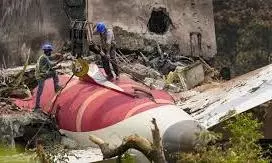
Air India AI171 crash: human factors experts join probe amid speculative reports targeting pilot
text_fieldsThe Aircraft Accident Investigation Bureau (AAIB) has brought in human factors specialists to assist with the investigation into the Air India AI-171 crash, the government informed Parliament on Thursday.
This step comes as global media scrutiny mounts, with some Western outlets suggesting pilot error may have caused the fatal incident.
Minister of State for Civil Aviation, Murlidhar Mohol, said that the AAIB has onboarded “B787 type-rated experienced pilots, type-rated engineers, aviation medicine specialists, human factor specialists, and flight recorder specialists” to provide subject matter expertise for the ongoing investigation.
Human factors specialists focus on understanding how pilot behavior, decision-making, stress levels, and workload impact aviation safety.
In the context of crash investigations, their role is to determine whether human error or procedural lapses may have played a role, ultimately helping to prevent future tragedies.
The June 12 crash of Air India flight AI-171, a Boeing 787 Dreamliner en route to London from Ahmedabad, resulted in the deaths of all 241 people on board and 19 on the ground. It was the first-ever total loss involving the Dreamliner aircraft.
According to the preliminary investigation report, the aircraft lost altitude and crashed shortly after takeoff due to the shutdown of both fuel control switches feeding the engines. However, the report stops short of explaining whether the switches were turned off manually or due to a technical malfunction.
Only one brief exchange from the cockpit voice recorder has been publicly released. In it, one pilot asks the other, “Why did he cut off?” to which the response was, “he didn’t.” The full transcript is expected to be included in the final report, which may provide more insight into the sequence of events.
In the absence of complete information, several international media outlets have published speculative reports.
The Wall Street Journal reported that “new details in the probe of last month’s Air India crash are shifting the focus to the senior pilot in the cockpit.”
Italian daily Corriere della Sera cited unnamed sources who alleged that the co-pilot repeatedly questioned the captain about why the engines were shut off.
Captain Sumeet Sabharwal, 56, and First Officer Clive Kunder, 32, were the pilots on duty, with over 19,000 combined flying hours - almost half on the Boeing 787. Both had cleared all required health checks before the flight.
These speculative narratives have drawn strong criticism from Indian aviation bodies.
The Indian Commercial Pilots' Association (ICPA) denounced the “reckless and unfounded insinuation” that pilot suicide may have caused the crash. “As long as the investigation continues and until the final report is published, any speculation, especially of such a grave nature, is unacceptable and must be condemned,” the ICPA said.
Sam Thomas, head of the Airline Pilots’ Association of India, which represents over 800 pilots, voiced concern about the investigation's opacity. “We are also reiterating the fact that suitably qualified personnel are not taken on board for these crucial investigations,” he said.
A five-member team appointed by the AAIB is currently leading the probe. The bureau urged the public and media to exercise caution and avoid premature conclusions. “Certain sections of the international media are repeatedly attempting to draw conclusions through selective and unverified reporting,” the AAIB said in a July 17 statement. “These actions are irresponsible, especially while the investigation remains ongoing.”












